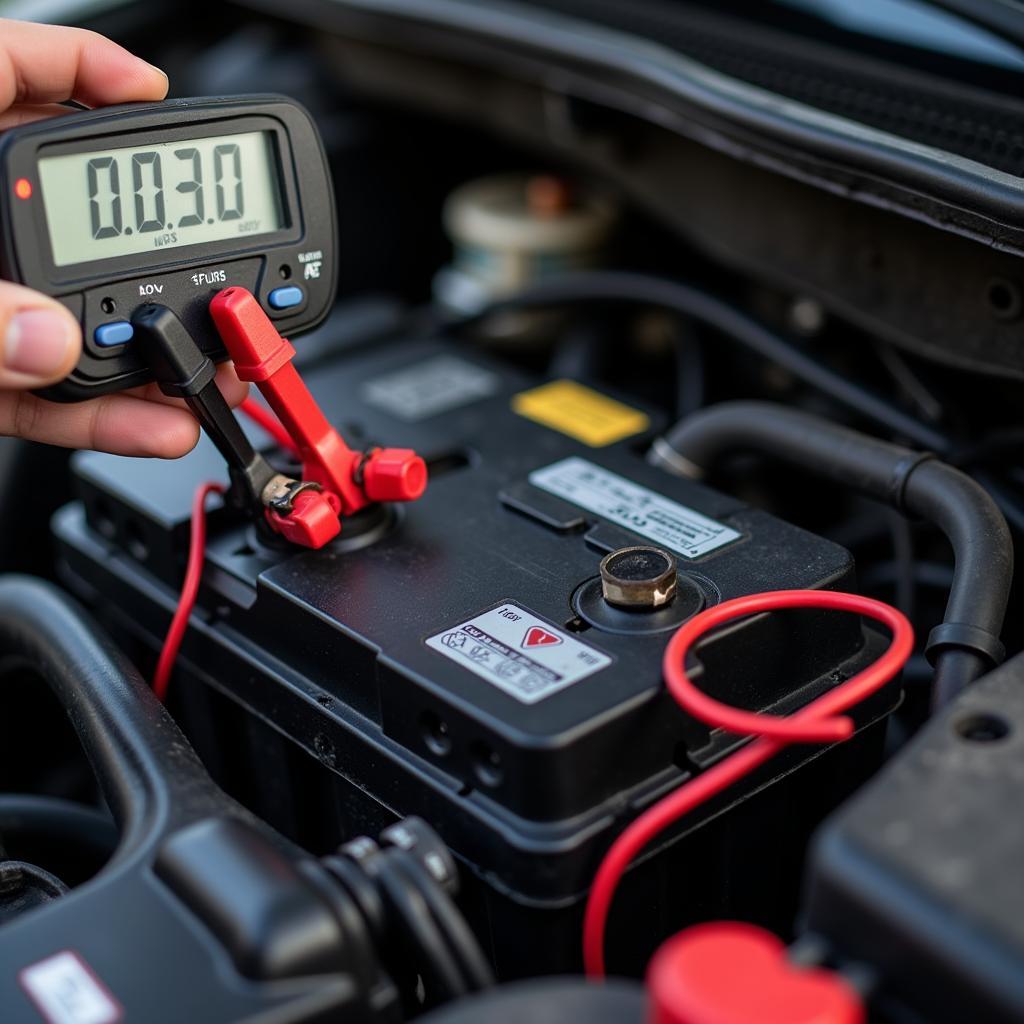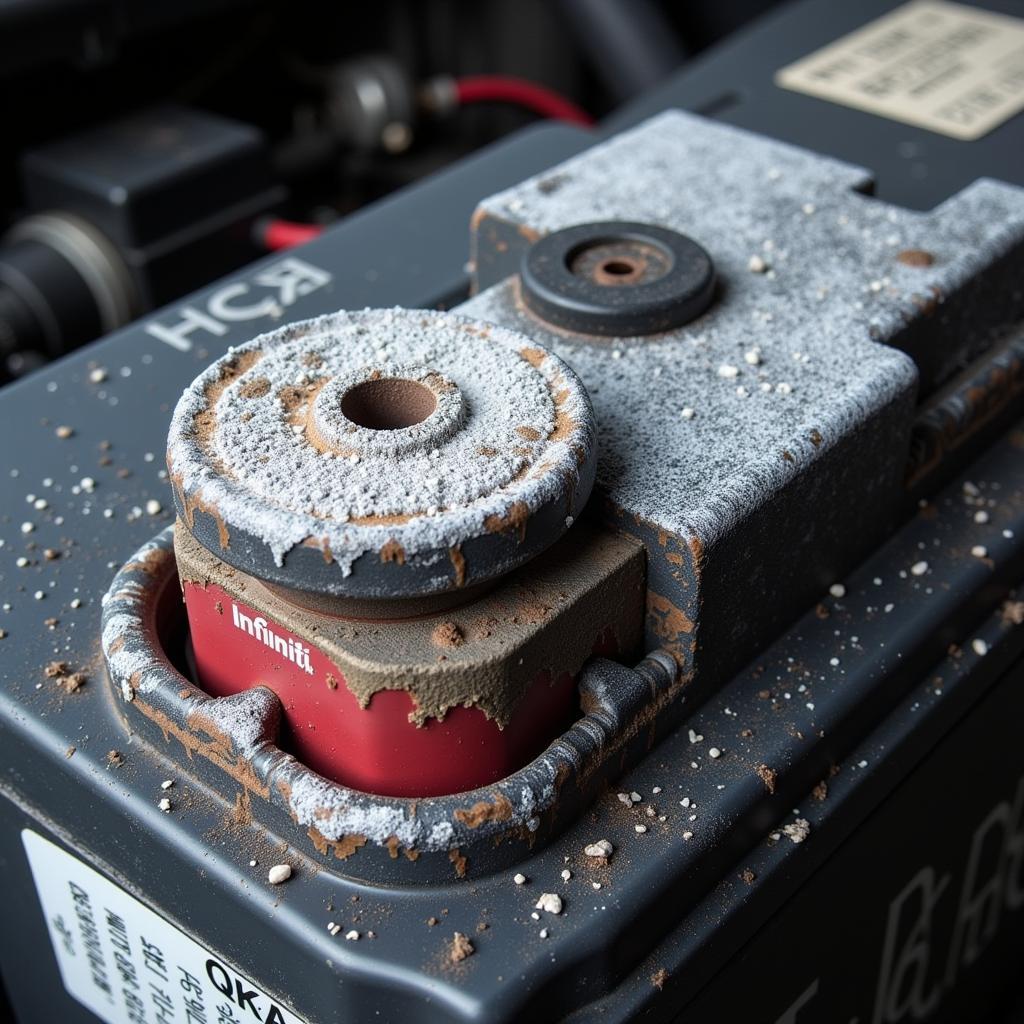A new car battery draining fast can be incredibly frustrating. You replaced the battery, expecting a smooth start every time, but it’s already struggling. What gives? This article explores the common causes of a new battery draining fast and provides solutions to help you get back on the road.
 New car battery draining fast: a close-up of a multimeter attached to a car battery, showing a low voltage reading.
New car battery draining fast: a close-up of a multimeter attached to a car battery, showing a low voltage reading.
Why is My New Car Battery Draining Fast?
Several factors can cause a new car battery to drain quickly, even if it seems perfectly fine. It’s not always a faulty battery. Sometimes, the culprit is an underlying electrical issue.
Parasitic Drain: The Silent Battery Killer
A parasitic drain occurs when a circuit in your vehicle continues to draw power even when the car is off. This constant drain can deplete your battery overnight, leaving you stranded in the morning. Common culprits include interior lights, faulty door switches, or even aftermarket accessories like radios and alarms.
Alternator Issues: Not Charging Properly
While a dead battery is often blamed, a faulty alternator can be the root of the problem. The alternator recharges the battery while the engine is running. If the alternator is failing, it won’t properly charge the battery, leading to a constant drain and eventually a dead battery. See our guides on dead battery vs dead alternator and dead battery vs alternator for more information.
Faulty Battery Installation: A Simple Oversight
Believe it or not, a new battery can drain quickly if it wasn’t installed correctly. Loose connections or corroded terminals can prevent the battery from charging properly, mimicking the symptoms of a bad battery.
Extreme Temperatures: A Seasonal Challenge
Extreme temperatures, both hot and cold, can affect battery performance. Extreme heat can accelerate battery discharge, while extreme cold can make it harder for the battery to hold a charge. This is why you might notice your battery draining faster during winter or summer months.
Troubleshooting a Draining Battery
Here’s a step-by-step guide to help you pinpoint the problem:
- Check for obvious drains: Inspect your car for any lights left on, including interior lights, glove compartment lights, and trunk lights.
- Test the alternator: Have your alternator tested at a local auto parts store or mechanic. This will determine if it’s charging the battery correctly. You can learn more by comparing a dead car battery vs alternator.
- Inspect battery connections: Ensure the battery terminals are clean and tightly connected.
- Perform a parasitic drain test: Use a multimeter to measure the current draw with the car off. This will help identify any hidden drains. Check out the difference between dead battery vs bad alternator to understand more.
- Consider professional diagnosis: If you can’t identify the problem, it’s best to consult a qualified automotive technician. They can perform a thorough diagnosis and identify any underlying electrical issues.
“A new battery draining fast isn’t always a sign of a faulty battery,” says John Smith, ASE Certified Master Technician. “Often, it’s a symptom of a larger electrical problem that needs to be addressed.”
Preventing Future Battery Drain
Once you’ve identified and fixed the problem, take steps to prevent future battery drain.
- Turn off all accessories before exiting your vehicle.
- Regularly check your battery connections for corrosion.
- Have your battery and alternator tested annually.
- Limit short trips, as they don’t give the alternator enough time to fully recharge the battery.
“Regular maintenance is key to preventing battery problems,” adds Jane Doe, Lead Electrical Systems Engineer at AutoTech Solutions. “A simple check can save you a lot of headaches down the road.” For understanding the various signs, refer to signs of dead battery vs alternator.
Conclusion
A new battery draining fast can be a frustrating experience, but with a little troubleshooting, you can identify the root cause and get your car back on the road. By understanding the common culprits and following the steps outlined in this article, you can prevent future battery drain and ensure your car starts reliably every time. Don’t let a draining battery leave you stranded. Take action now!

